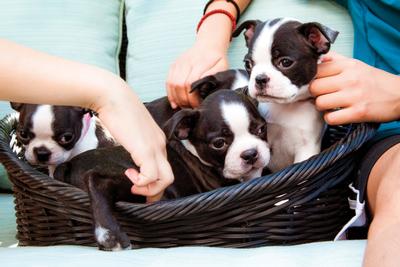It’s his new home, but there are lots of potential hazards lying in wait. After all, puppies are babies, which means they’re lively, curious, and they teethe. They can find themselves in serious trouble, so it’s best to take preventative measures. Keep in mind that a puppy has a lower vantage point than yours — like that of a crawling baby — and may be attracted to things you cannot see when you are standing up.
It’s almost impossible to completely puppy-proof your home against accidents, but see below for some suggestions on how you can go on a puppy hazard home inspection.
- Confine your puppy to a safe area inside. Keep doors and windows closed and screened securely.
- Your puppy should not be left unsupervised, either outdoors or in. Puppies like to investigate things, wander about and sometimes get into mischief (eg. soil things, chew things, get locked in closets or rooms, etc.).
- Keep your puppy off of balconies, upper porches and high decks.
- Be sure to securely store all cleaning supplies, detergent, bleach, paint and paint thinner, fertilizer, disinfectants, mothballs, insect and rodent poisons, and antifreeze. Make sure you keep these items where your puppy cannot access them, preferably on high storage shelves in closed cabinets.
- Keep all toilet lids down when they’re not in use. Otherwise, your puppy might climb inside and hurt himself. Also, note that toilet bowl cleansers are harmful if swallowed; be sure to keep yours securely fastened and stored away someplace where your puppy can’t find them.
- Unplug, remove or cover any electrical cords in your puppy’s confinement area. Chewing on live wires can lead to severe mouth burns, electrocution, or house fires. Likewise, be sure not to use electric blankets or pads to line your puppy’s bed. It’s also probably a good idea to cover electrical outlets with plug covers when they’re not in use.
- Never give your puppy any medication without first consulting your veterinarian.
- Keep all medications (prescription and over-the-counter) out of your puppy’s reach.
- Check to see where your puppy’s located before closing any doors. Make it a habit to conduct a “puppy check” before leaving home to make sure your puppy has not accidentally been locked in an unsafe area.
- Always keep sewing supplies and small hardware out of your puppy’s reach. Buttons, beads, needles, pins, balls of string or yarn, and thread can hurt his mouth or internal organs if swallowed. The same goes for nails, staples, screws, paper clips, tabs from aluminum cans and other sharp objects.
- Small puppies can get tangled up in plastic six-pack beverage holders. Cut the holders up into smaller pieces to prevent this from happening.
- Keep all plastic bags someplace secure where your puppy can’t access them. This prevents any chance of him getting trapped inside or chewing up and swallowing bits of plastic, which could be very harmful to his digestive system.
- Please be mindful of putting ribbons around your puppy’s neck. They can easily become a choking hazard, and could lead to digestive problems if your puppy were to attempt to chew it up and swallow it.



